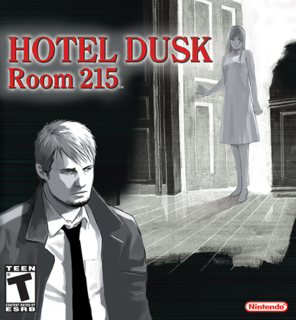Hotel Dusk is a refreshingly playable and story-driven adventure game.
-: The puzzles could use with just a little more complexity.
The adventure genre has pretty much lost all of it's influence over the past decade. Once the symbol of great stories, interesting puzzles, and immersion; in an increasingly money driven industry the adventure genre has become notorious for it's inability to attract sales. Although Hotel Dusk: Room 215 doesn't break this trend, it is a fresh and well put-together adventure that presents some interesting uses of the touch screen in addition to it's excellent story.
From the same people that created the mysterious Another Code you would expect a similarly mysterious game from Hotel Dusk, thankfully though it is nowhere near as pretentious nor does it sacrifice that games best qualities. Kyle Hyde is presented as the main character of the story, a depressed and callous (not as if that's a bad thing) ex-cop searching for his missing partner Bradley, whom he shot 3 years ago. The mysterious yet warm atmosphere pretty much kicks in as soon as you set foot inside the hotel, after being prompted to open the front door with the touch screen. The environment is pleasingly unkempt with graphical touches such as eroded floors to emphasize this, what you may or may not like is that you'll be staying here throughout the entire game. Not as if that's a bad thing.
Hotel Dusk is one of those DS games that can be played entirely with the touch screen. Whilst you are moving around the hotel the touch screen acts as a mini-map where you can press down in the direction you want to move. Examining objects and opening doors are controlled by two icons at the bottom left, and will flash white when either of those actions can be performed. It seems like a logical system at first, and mostly it works well if not to immerse you into the experience. Examining is handled well with a trademark double-tap used to go into more detail about objects, occasionally pulling funny one-liners from the lovably sarcastic main character, with a notebook feature for any of you who find simple plot details straining to remember. Moving with the stylus on the other hand is a bit of a chore, but to be fair it's hard to imagine any other way of doing it.
The gameplay design of Hotel Dusk is simple and logical making a worthy interlude between the extensive character discussions. The structure is routine, you figure out what item to use on an object, where to get it, and then you are sucked into a closeup of that object where you figure out what else to do with the stylus. This structure is resemblant of classic adventure design and is both intuitive and logical, but at the same time you'd wish some of the puzzles could be just a little more complex in the first place.
For some the real action of Hotel Dusk lies in speaking with the multitude of characters, which is an essential part of gameplay progress. In another throwback to classic game design you are often given a variety of options to choose from during dialog; but all of those options are in the main characters native language of questions, which Hyde will have in his mind if something mysterious crops up. Questions come in three flavors: white, yellow, and red. White questions can be asked to pretty much anybody, yellow to a specific character; red questions on the other hand are like yellows but far more important, and are dedicated to solving specific problems that arise towards the end of each chapter. Being deprived of the ability to ask red questions often ends up in a depressing 'game over' because they are essential to finding Hyde's missing partner; game over screens can also be triggered by a variety of other conditions.
The story is easily Hotel Dusk's greatest asset because it is so perfectly mundane yet interesting and driven by a great cast of characters. Like any good mystery novel you may be able to figure out the story before the end, but thankfully most of the secrets you uncover are gratifyingly
unpredictable. The characters in the game are an odd bunch, modeled to scarily accurate personality models, Louis DeNonno being one of the stars as a rascally but somehow suave street-punk and light womaniser. The dialog is highly entertaining and sharply written, although speech is a no-no. To be honest, if reading is a serious problem for you you probably don't deserve full speech anyway.
Hotel Dusk's presentation is mostly superb. The visuals combine some of the best 3D on the DS with great character artworks to create one of the most stylish games on the DS. Characters mostly border between realistic and cartoon-like, and are done in this ridiculously cool noir style which blends detailed expression with a distinctively hand-drawn look. The music is also mostly top notch stuff, save for the annoying and repetitive elevator music ironically titled 'play it again' that plays over and over again in most sections of the hotel.
In the end Hotel Dusk succeeds in being another good adventure game for the DS, if not the best one so far. It's well constructed, original and stylishly executed. It's also a great value proposition giving you a meaty 12-15 hours of gameplay. If you're looking for a peaceful slice of good adventuring look no further than Hotel Dusk.

